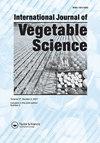Potato yield modeling based on meteorological factors using discriminant analysis and artificial neural networks
IF 1.1
Q2 Agricultural and Biological Sciences
引用次数: 0
Abstract
ABSTRACT A reliable, pre-harvest, crop yield prediction based on meteorological factors is important to anticipate adverse effect of weather variables. Discriminant score-based regression models, MLP artificial neural network (ANN) models, and regression-ANN hybrid models were used to model potato (Solanum tuberosum L.) yield. Maximum and minimum temperatures, rainfall, and relative humidity, and their indices, were used to obtain discriminant scores for each year. These discriminant scores, along with a time variable, were used as inputs and potato yield as outputs for the development of models. A hybrid model consisting of linear and non-linear components performed better than individual models if combined linearity and nonlinearity are present in the data, else the ANN models were better than regression models. The best models can be used to obtain a reliable forecast of potato yield at 6–8 weeks before harvest using meteorological data.基于气象因子的马铃薯产量判别分析和人工神经网络建模
摘要基于气象因素的可靠的收获前作物产量预测对于预测天气变量的不利影响非常重要。采用基于判别得分的回归模型、MLP人工神经网络模型和回归-神经网络混合模型对马铃薯产量进行了建模。使用最高和最低温度、降雨量和相对湿度及其指数来获得每年的判别得分。这些判别得分和一个时间变量被用作模型开发的输入,土豆产量被用作输出。如果数据中存在线性和非线性组合,则由线性和非线性分量组成的混合模型比单独模型表现更好,否则ANN模型比回归模型更好。最佳模型可用于利用气象数据对收获前6-8周的马铃薯产量进行可靠预测。
本文章由计算机程序翻译,如有差异,请以英文原文为准。
求助全文
约1分钟内获得全文
求助全文
来源期刊

International Journal of Vegetable Science
Agricultural and Biological Sciences-Plant Science
CiteScore
3.10
自引率
0.00%
发文量
30
期刊介绍:
The International Journal of Vegetable Science features innovative articles on all aspects of vegetable production, including growth regulation, pest management, sustainable production, harvesting, handling, storage, shipping, and final consumption. Researchers, practitioners, and academics present current findings on new crops and protected culture as well as traditional crops, examine marketing trends in the commercial vegetable industry, and address vital issues of concern to breeders, production managers, and processors working in all continents where vegetables are grown.
 求助内容:
求助内容: 应助结果提醒方式:
应助结果提醒方式:


